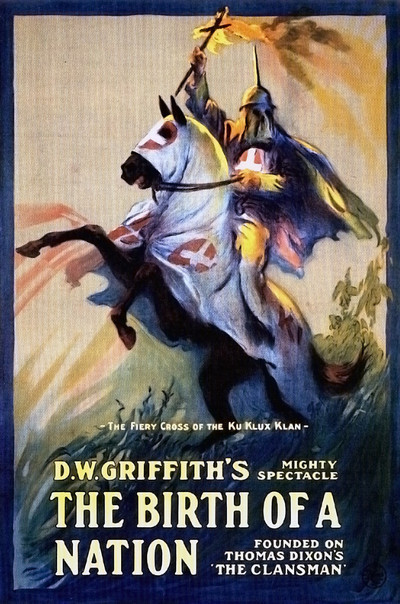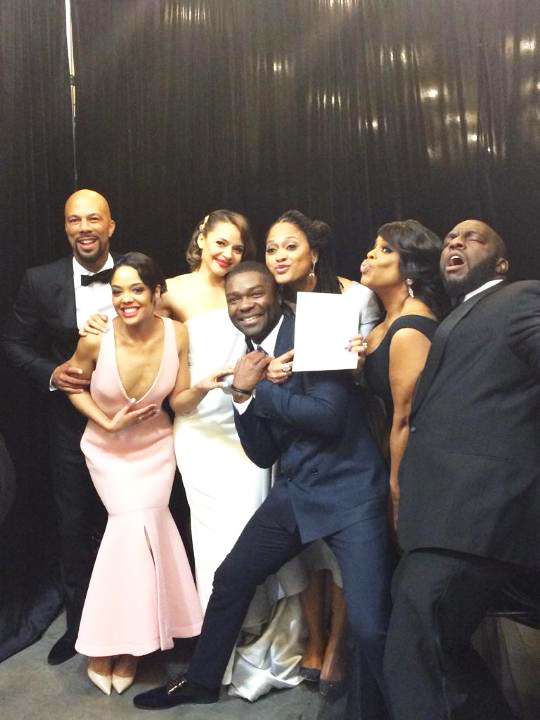Belated Thoughts on This Weekend's Unintentional Selma / Birth of a Nation Confluence
 Monday, February 9, 2015 at 2:04PM
Monday, February 9, 2015 at 2:04PM  We're Living History Right Now
We're Living History Right Now
I meant to post something this over the weekend but kept freezing from indecision and confusions about what to write. If you were offline this weekend, you might have missed that one of the most important films of all time, Birth of a Nation (1915) hit its Centennial anniversary. As you know we love to celebrate centennials at TFE but how to even deal with that one? Hideously racist though it was and is, D.W. Griffith's blockbuster informed and shaped much of this artform, the movies, that we all love today. I first saw it in an Introduction to Film type class in my freshman year of college and as creepy as it was to see the lovely crucial silent superstar Lillian Gish used as a pawn to trump up its racial hatred as she is saved from a rapist (a white actor in blackface) by the Klu Klux Klan, it was also startling to see what a technical and narrative leap it was in terms of early cinema.
And the exact same weekend that that film, which has long been a (deserved) target of the NAACP was hitting 100*, The NAACP was holding their annual Image Awards. Selma won big at (but let's pretend that bizarre director snub -- the guy who made The Equalizer beat Ava DuVernay? -- didn't happen. But the NAACP hasn't been the only group cheering Selma on. It's been enjoying a very healthy if unspectacular box office as a Best Picture Oscar nominee, Ava received a historic Folden Globe nomination late last year, and her films Original Song "Glory," also Oscar nominated, was performed at the Grammys yesterday.
At first I was all... this is such a gross coincidence and I'll just send people to fine articles at the New York Post and Vulture. But then I realized how beautiful the juxtaposition was in terms of progress.
100 years of tumultuous history have passed between those two films and when the smoke clears we see that America has come a long long way. These battles for basic human dignity and equality are never fully won of course (Black History is hardly the only history plagued with civil rights violations and demonization of "the other") and you have to keep fighting them. But for all the nostalgia the past can bring to people, sometimes the now is vastly preferrable.
 'Selma' beauties enjoying their big NAACP night
'Selma' beauties enjoying their big NAACP night
And, wouldn't you know it... Martin Luther King Jr said it best himself.
The arc of the moral universe is long, but it bends towards justice
* There are different dates online for when Birth of a Nation premiered. Wikipedia says February 8th, the bulk of internet articles about its Centennial appeared on February 7th, but a lot of articles on the film mention a March 3rd premiere.



Reader Comments (8)
About your footnote: BOAN had its big fancy Los Angeles premiere on February 8, under the title The Clansman; it had its commercial debut on March 3 in New York, under its current name.
And it really is a remarkable juxtaposition. I remembering thinking about that when DuVernay screened Selma at the White House; because on top of everything else, BOAN was the very first movie to ever have that honor, as well.
Excellent article. We need more perspective through cinema of the civil rights movement.
This is a truly great juxtaposition for all the reasons you've given. Excellent post!
As a non-black non-American person, my opinion on this matter is completely beside the point but for what it's worth: for me, the politics behind The Birth of a Nation are so grotesque and obviously outdated that they don't diminish the impact of the film anywhere near as much as they would if I was an at least minimally enlightened person watching it in 1915.
I think it's an astounding film, mesmerising to this day for some good reasons as well as the obviously hideous ones.
Intolerance from the following year though, eclipses it in every way and thankfully isn't at all icky.
Meantime, I finally had a chance to catch Selma and was thoroughly let down. I was still deeply moved by the march sequences - it's impossible not to be - but this slice of history and this man deserve so much more beyond the extremely clunky exposition and Oyolewo's really rather bland performance. The film was way more trite and conventional than the reviews led me to believe. This subject matter deserves its own Battle of Algiers, not its own Philadelphia. (Okay Philadelphia is a slight exaggeration but I was so frustrated by the conventionality.)
As cheered as I would have been to see a black American woman get nominated for Best Director, I don't feel like DuVernay would've earned it based on merit because her direction is extremely uneven, to say the least.
That said, Bennet Miller's was even more misguided.
The Birth of a Nation got so much under my skin that I ended up incorporating footage from it in a performance project that was originally presented in an art gallery in Los Angeles a few years ago. The theme of the piece was African-American conservatism, in particular Black Republicans, and a primary element of the design was a video backdrop featuring overlapping images from Mandingo, Gone With the Wind, "gay thug porn," the notorious Censored Eleven Warner Bros. cartoons, an Amos 'n' Andy theatrical feature, and The Birth of a Nation. That was just one aspect of the visuals. The text, costume and installation were a whole other story. It was a very surreal and challenging performance, to say the least.
But by appropriating the Griffith beast, I think I was able to tame it to some degree and harness its power in an alternative, 21st Century context.
Paul - i wish i coulda seen that!
It's interesting to think that The Birth of a Nation takes place in and around 1865 and Selma takes place in 1965, basically 50 years before each film was made. I remember hating TBOAN but finding Intolerance fascinating. D. W. Griffith is an important American director, but I also think he gets way too much credit.
Nat: It's only been performed twice, but I could do it again at a moment's notice. It remains both timely and out-of time somehow.